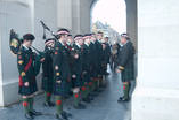David was recently asked to act as a relief driver for one day around the Battlefields of Ypres. His group was from the Calgary Highlanders Army Cadet Corps who had been following the progress of the 10th Battalion, 1st Canadian Division, which was the former unit of the regiment across northern France and Belgium in both world wars. After forming up for inspection next morning in their distinctive red fleeces (and by gosh they were needed that day) and woolly hats, we set off to visit sites with significant Canadian interest. The details supplied by Mark included diagrams of the area showing positions of the protagonists, graphic descriptions of the action, summaries of individual acts of bravery and copies of photographs taken at the time. The whole day’s experience was riveting.
Among the visits we made were to several cemeteries, including Tyne Cot and Essex Farm where the Canadian doctor John McCrae, who while based here at a field dressing station in 1915, penned the most famous WWI poem, In Flanders Field. With the Cadets in attendance, one of the officers read the poem in total silence. It was this poem that gave us the image of the poppy, which to this day is our symbol of remembrance.
In Flanders fields the poppies blow
Between the crosses, row on row,
That mark our place; and in the sky
The larks, still bravely singing, fly
Scarce heard amid the guns below.
We are the Dead. Short days ago
We lived, felt dawn, saw sunset glow,
Loved, and were loved, and now we lie
In Flanders fields.
Take up our quarrel with the foe:
To you from failing hands we throw
The torch; be yours to hold it high.
If ye break faith with us who die
We shall not sleep, through poppies grow
In Flanders fields.
The group also visited the spot where the Canadians stood and faced the first poison gas used by the Germans against the Allied lines. Mark once again brought to life the effect it had and how former chemists in the line tried to combat the menace with the instruction ‘pee on your handkerchief and breathe through it’.
Among the Canadian memorials we visited were the Brooding Soldier at St Julien, Passchendaele and Kitcheners Wood. It was here that we stopped at the 10th Battalion memorial set by the side of a local road and the group were drawn up. To the sound of their two pipers, a simple wreath laying ceremony took place. This all happened while local traffic stopped and the drivers looked on with patience and maybe a little emotion. I certainly had a lump in my throat.
We finished our days tour by five o’clock, returning to the hotel so that the group could change into full uniform for that evening’s ceremony at the Menin Gate. This includes laying of wreaths and the playing of the Last Post by buglers of the local fire brigade and is carried out every evening at 8.00pm and has been since 1928. This was on the first anniversary of the unveiling of the Menin Gate, probably the most well known of all First World War memorials on the Western Front, as it lists the names of over 54,000 British and Commonwealth troops who died in the Ypres Salient and have no known grave..
At that evenings ceremony eight of our party formed an honour guard leading to the position where wreaths were to be laid and the two pipers joined the buglers. After the playing of the Last Post, the pipers played laments while several wreaths were laid, led by a young Australian group from Adelaide including a member of their parliament. The wreath party from the Calgary Highlanders was next and the three cadets carried out their duty with military precision.
At the completion, the hundreds of spectators started to disperse and our contingent formed up and marched off through the town to the pipes playing the regimental march. The effect on the town was magical with people pouring out of the shops, cafes and houses with cameras at the ready or just to hear or even march with them. What a glorious end to a magical day!
